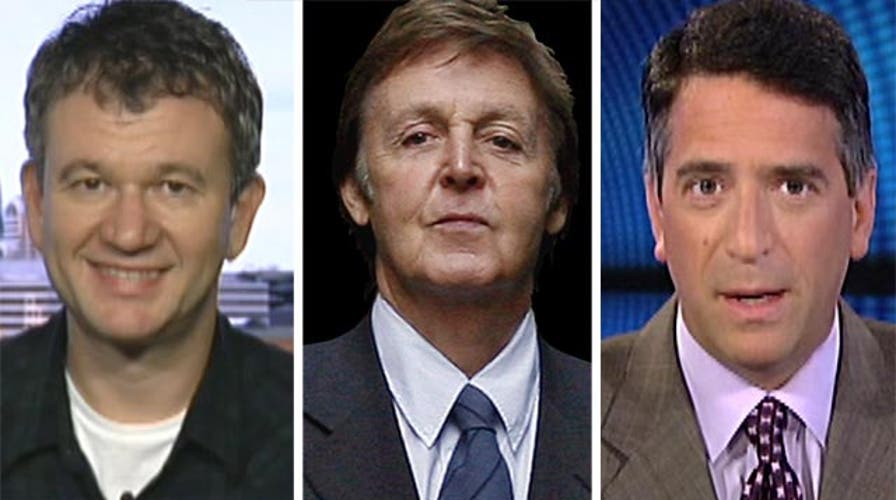The Foxhole: Tumultuous decade for rocker Paul McCartney
Author Tom Doyle explains in 'Man on the Run: Paul McCartney in the 1970s'
When you were young and your heart was an open book, you and your boyhood chums wrote and recorded twenty #1 hit songs and made a series of charming movies, set all kinds of cultural trends and dramatically reshaped Western civilization, enjoyed critical and commercial success unprecedented and unending, had every media outlet and pretty girl of the era screaming madly for you – until suddenly it all ended, amid a tangle of lawsuits and acrimony ... with the four of you barely even speaking to each other ... and you were left to wonder if you would ever again – could ever again – play music...
Such was the situation in which Paul McCartney found himself in the spring of 1970, when the Beatles broke up. Sequestered at his rustic, overgrown farm in Scotland with new wife Linda, her daughter Heather from a previous marriage, and their baby daughter Mary, the man once known as “the cute Beatle” tumbled into a routine of rising late, drinking early, and struggling, in a fog of depression, to piece together how everything had collapsed and what he might do next. McCartney’s struggle to emerge from the shadow of the Beatles, to forge a second career in music – he was not yet twenty-eight! – lasted a decade, until the assassination of his old mate John Lennon, in December 1980.
Now, for the first time, this extraordinary period in McCartney’s evolution, which witnessed the ex-Beatle’s creative and commercial zenith as a solo performer, is chronicled in an authoritative book, entitled Man on the Run: Paul McCartney in the 1970s (Ballantine Books, 2014). Scottish-born author Tom Doyle, a contributing editor to the British music magazine Q, has interviewed Sir Paul a dozen or more times since 2006: more than any other writer or reporter. Peppered with these insights, Man on the Run provides a comprehensive account of Paul’s shifting personal and creative terrain, from the homespun charm of the McCartney LP (1970), which featured the rock anthem “Maybe I’m Amazed,” to the techno experimentation of McCartney II (1980), which scored with the hit single “Coming Up.”
Doyle found his sessions with McCartney an intriguing foray into both the performer’s storied past and the way his mind, crammed with twenty lifetimes’ worth of information and memories, now plays tricks on its overwhelmed owner. “It’s really tough,” Doyle said in a recent visit to The Foxhole. “I mean, you’re talking to people about forty years ago. You know, I find it hard to remember five years ago! And these guys were living an accelerated life, and so a lot of it is kind of a blur for them.”
Doyle described his discussions with McCartney about the iconic moment from even farther back in time – February 1964 – when the Beatles, enjoying their first visit to America, climbed into a Miami boxing ring to pose alongside Cassius Clay, then training for his upcoming title bout with Sonny Liston. The Fab Four lined up with their heads next to each other and Clay – soon to become heavyweight champion and rename himself Muhammad Ali – pretended to punch them and create a domino effect. “He [Paul] can’t remember that picture at all,” Doyle said.
Another methodological problem included keeping the legendary interviewee on-topic. “Sometimes,” Doyle said, “we’ll be trying to talk about 1976 and he starts talking about [the 1969 song on the Abbey Road LP] ‘Maxwell’s Silver Hammer,’ and you’re thinking, ‘I could listen to this all day, right, but this is not what we’re doing!’”
Still another tricky business was pressing McCartney – gingerly – on topics where the performer appeared somewhat reluctant to go deeper. “Sometimes you have to repeat questions, go around them,” Doyle said. “Sometimes it gets on people’s nerves and I could see it sometimes with him, you know. He would kind of be exasperated and then kind of sigh and go, ‘Look, to be honest...’ and I thought, ‘Whoa! Right, okay, we’re being honest now!’
“And sometimes, I mean, I did push him…I did talk to him about the fact that obviously, after Lennon’s murder, he didn’t tour again, right, for another eight or nine years [note: The gap was nine years]. And I said, ‘Was that because of what happened, man?’ And he was like, ‘No, no, it wasn’t that.’ And I said, ‘Well, people would understand if that’s what had happened.’ And he was like, ‘No…I mean, what was I doing? I was bringing up kids.’
“And I thought: ‘I’m not really buying this.’ … And I said, ‘Look, people would really understand, you know, security fears, all this sort of stuff.’ And he said, ‘Look, you know, I think I just didn’t have a band.’ Right? So he was getting a little bit annoyed there. And I said, ‘Well, you could always get a band, can’t you, Paul?’ Right? And he said, ‘Phseesh, I just think maybe I couldn’t be bothered!’ [laughs] So it was one of those things, you know. Sometimes you can push and push and push and really all you end up with is exasperation.”
Click here to watch the full episode of The Foxhole with guest Tom Doyle.

